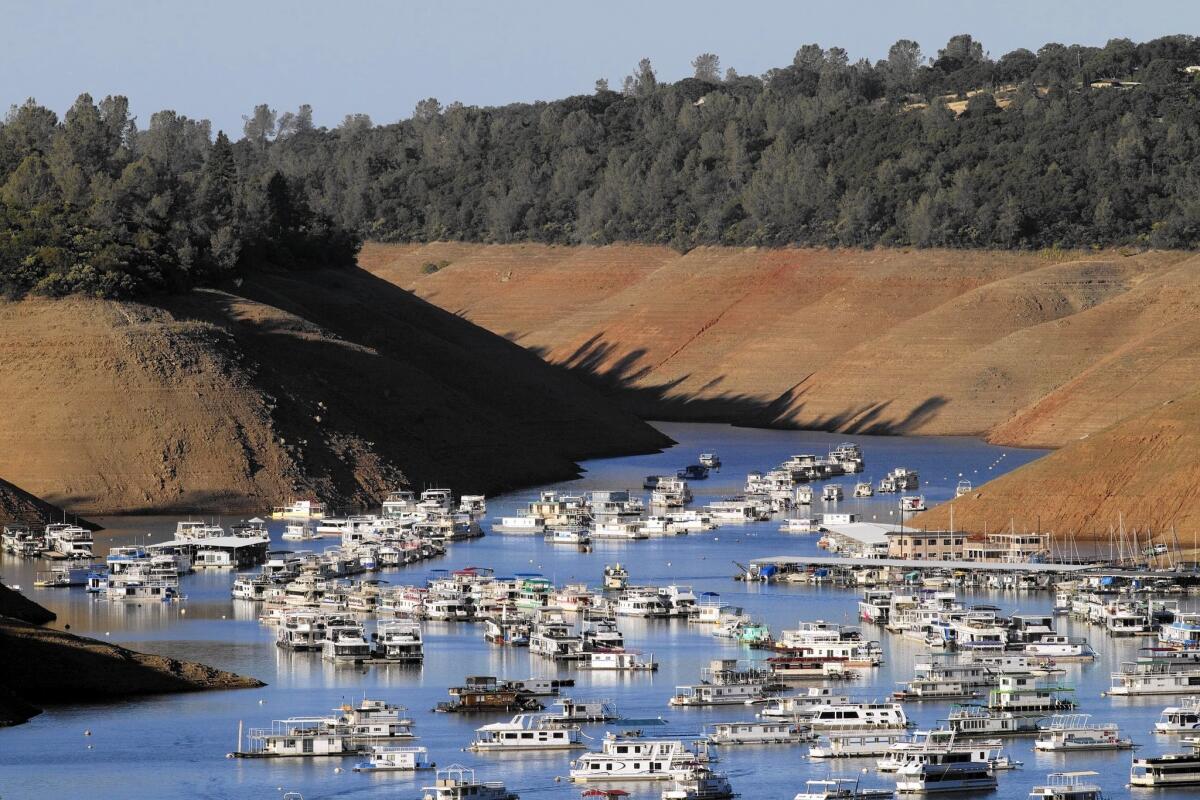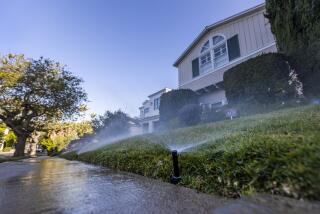Prop. 1 aims to relieve drought — but not this one

California’s stubborn drought helped push a $7.5-billion water bond through the Legislature and onto the November ballot. But even if voters approve Proposition 1, it won’t provide relief any time soon.
“It’s going to be a long time before we see anything really happen from it,” said Paul Wenger, president of the California Farm Bureau Federation, which backs the bond.
A priority of Gov. Jerry Brown, the measure has gained substantial support by spreading money around for a range of water projects that proponents argue are vital to California’s future. The bond measure could bankroll such things as a new dam in the Sacramento Valley, stream protections in the Sierra Nevada and treatment of contaminated groundwater in the Los Angeles Basin.
Proposition 1 doesn’t earmark funds for any specific projects. But regional interests across California know exactly which parts of the bond measure could send big bucks their way.
Central Valley farmers are eyeing the storage funding. Los Angeles is hoping for hefty slices of the $900 million allocated to groundwater cleanup and the $725 million for recycling treated wastewater. Poor, rural communities will line up for pieces of the $520 million to improve drinking water quality and sewage treatment.
Opponents say the proposition sets the wrong priorities by directing $2.7 billion to new storage projects that won’t solve the state’s water problems.
Both critics and supporters of Proposition 1 acknowledge, though, that because it would be years before any major projects funded by the bond are up and operating, it is unlikely to help Californians cope with the current drought.
“This is about preparing for the next drought and the drought after that and the drought after that,” said Doug Obegi, an attorney with the Natural Resources Defense Council, an environmental organization that supports the bond measure.
Proposition 1, the Water Quality, Supply and Infrastructure Improvement Act of 2014, would be the fourth-largest water bond measure in state history, according to the Pacific Institute, an Oakland think tank. It replaces an $11.1-billion bond measure that lawmakers approved five years ago but kept off the ballot when the Great Recession and the state’s sinking economy dimmed its chances for approval.
The Nov. 4 measure would authorize $7.1 billion in new state borrowing and redirect $425 million from previous bonds. Including interest, it would cost state taxpayers $14.4 billion over four decades.
Its provisions call for the California Water Commission, whose nine members are appointed by the governor, to decide which groundwater and surface water storage projects get funded. Proposals would be ranked according to the “public benefits” they provide, including ecosystem and water quality improvements, flood control and recreation.
Other programs that could be funded by the bonds would require legislative approval, usually by being included in the state budget.
If Proposition 1 passes, Los Angeles plans to pursue hundreds of millions of dollars for water recycling and remediation of industrial pollution that has shut down about half the city wells in the San Fernando Valley.
“We are setting ourselves up very carefully to make sure that we are fully competitive for as much money as we can get,” said Marty Adams, a deputy senior assistant general manager at the Los Angeles Department of Water and Power.
The state money, which would require a 50% local match, would help L.A. develop local water resources and reduce its reliance on imported supplies from Northern California and the Colorado River. “The goal is to be able to stand on our two feet better than we can currently,” Adams said.
Other bond provisions would funnel money into statewide watershed protection, flood management, stormwater capture, drinking water improvement and wastewater systems for disadvantaged communities.
Regional conservancies throughout the state, including five in Southern California, would get $327.5 million if the bond is approved. That would include $25 million for the Sierra Nevada Conservancy, $30 million for the Santa Monica Mountains Conservancy and $10 million for the Baldwin Hills Conservancy.
Representatives of the Santa Monica and Baldwin Hills conservancies in the Southland said the money would probably be used to capture urban runoff from rainstorms and to restore wetlands and streamside habitat.
Opposition to the measure, principally mounted by a number of smaller environmental groups, centers on the big pot of money set aside for new water storage.
The bond measure would allow state money to cover no more than half the total cost of a storage project. The rest would come from water users and possibly federal sources.
Although both groundwater and surface water projects would be eligible for the storage funds, opponents say the bond measure sets the stage for two costly new dams and reservoirs long sought by agriculture: Temperance Flat would be built on the upper San Joaquin River, and Sites, an off-stream project, would store Sacramento River water.
“Anybody who’s been paying attention to the politics and … the deal that was struck around that section of the bond knows that Temperance Flat and Sites are at the top of the agenda,” said Adam Scow of Food & Water Watch, a nonprofit that advocates for policies that promote clean food and water.
Jay Ziegler, California policy director for the Nature Conservancy, which supports the bond measure, countered that the selection process could yield some surprises. “The portfolio of projects that meet the criteria … are likely to be very different” than many expect, he said.
Proposition 1 specifically prohibits the use of bond money for the design or construction of two giant water tunnels under the Sacramento-San Joaquin delta that would be used to send Sacramento River water south. Proposed by major water agencies, the project is vehemently opposed by delta politicians, who lobbied hard to keep it out of the bond measure.
The measure does, however, contain funding for programs that could indirectly help the tunnel project, which is undergoing a lengthy environmental review.
“It becomes very murky as to where the money will go,” said tunnel opponent Barbara Barrigan-Parrilla of Restore the Delta.
She criticized the proposition as the creation of “big ag, big green and big unions,” arguing that it would shortchange programs for conservation, recycling and groundwater cleanup.
“We are very concerned that we are going to be investing in the wrong infrastructure for the future,” she said.







